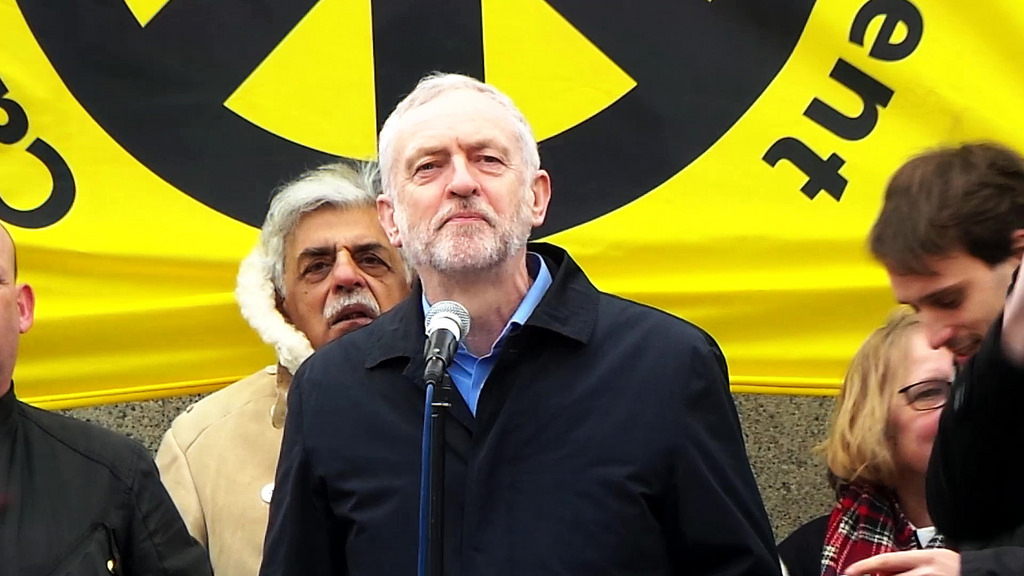The Two Pillars of Corbynism: The Only Way for Labour to Respond to Brexit
by Tom Cutterham
30 June 2016

Jeremy Corbyn is the leader of the Labour party not because he fits the bill of what a modern politician is supposed to look like, but because his long career – including his insurgent leadership campaign – embodies certain principles.
There are two pillars of Corbynism, two basic commitments. Although neither one is radical in itself, they have rarely been combined in the outlook of leading British politicians. One pillar is public investment, public ownership, and democratic governance of public services. The other is an anti-racist workers’ internationalism, the free movement of people, and our collective duty to migrants and refugees.
Both these commitments are equally indispensable. When an opposition candidate finally gathers the courage to step forward from among the parliamentary party, it is the combination of these principles that they will have to reckon with.
There are two reasons I think that’s important. Firstly and immediately: it means Corbyn’s opponents in the party face a curious dilemma. They have struggled and will keep on struggling to devise a coherent alternative vision, because the two factions opposing him have different disagreements. Secondly and more importantly: the combination of these principles is the only way Labour can respond to Brexit positively, effectively and decently.
Corbyn holds the balance of ideas in Labour.
Some, maybe most, of Corbyn’s parliamentary combatants want to ditch his anti-racism. They seek a return, with added gusto, to ‘Controls on Immigration’. Tom Watson and Yvette Cooper have both gestured in this direction lately. In a recent speech, Cooper promised to outflank Boris Johnson to his right by halting the “free movement of unskilled workers,” even while acknowledging that such a pledge puts access to the European single market at risk. Doubling down on the failed politics of Ed Milliband’s campaign, this tendency within the party vainly hopes to capture Brexit voters with a watered-down version of Ukip’s anti-migrant rhetoric.
They clash, on the other side, with Labour’s business-oriented liberals – those weary few who still remember Tony Blair with fondness. This is a tendency that celebrates, rather than cringes, at the thought of Britain’s ethnic and racial diversity. Yet at the same time, it is implacably opposed to an egalitarian and socialist economic policy. It is the movement of privatisation and the shrinking welfare state, of tuition fees for students and tax breaks for millionaires.
This faction, it’s true, has been routed since Blair’s fall. The Progress-backed national executive committee candidate (and pro-Israel campaigner) Luke Akehurst recently described free movement as an “economic blizzard,” while equating anti-racism with “the prejudices of a … middle class and metropolitan membership.” Liz Kendall’s 4.5% showing in the leadership election last year marked the decline of Blairite influence. Yet MPs like Kendall and Chuka Umunna (once touted as leadership material himself) still have their influence, and crucial links to donors with the deepest pockets. Any challenger to Corbyn needs both sides to be sure of winning. But the Labour MP who can square this circle? She does not exist.
Only Corbyn’s principles help us respond to Brexit.
It is only Corbyn and his allies who combine a forthright opposition to reactionary nativism with commitment to a social democratic agenda of public ownership and strategic investment. That is what the members saw in him last summer, and that is the reason tens of thousands are now rallying to his defence. As I said, these aren’t radical positions. They’re just hard to find in the lamentable ranks of Labour’s MPs. And these two principles are more important now than ever: not because of any leadership election, but because of Brexit.
Labour must have something to say to Leave voters left behind by global capitalism. They have reasons to be pissed off. Our response should be to invest in rebuilding communities across the country, through public infrastructure programmes and expanding the capacity of public services. Hoping to cushion the coming economic crash, the Bank of England has started the liquidity pumps. Labour’s economic policy should ensure these policies distribute credit and cash where it is most needed, extending the arm of the entrepreneurial state through regional investment funds. Punishing Leave voters by allowing them to face the economic hit of Brexit is not an option.
Likewise, we cannot allow migrants – including refugees and would-be immigrants not yet arrived – to take the brunt of coming crisis either. Partly because that would damage the economy overall, which needs a continuing influx of youthful labour-power. But mostly because to do so would be utterly shameful. Daniel Trilling, who knows more than most about the British far-right, recently tweeted: “Whatever you think about Corbyn, if he goes you lose one of the few senior English politicians who unambiguously defends migrants’ rights.”
The racism that fuelled the Brexit campaign – and has grown bolder after the result – can only be met by a renewed commitment to uncompromising anti-racist politics. No dog-whistles, no pandering, and no mugs. That basic human decency goes hand in hand with economic common sense. If we agree with most economists that immigration is an economic benefit, then we must fight for open borders. And if we agree that in some places, public services are overstretched, then we must fight for more public investment, and for public ownership that puts the common good above all else.
Only Jeremy Corbyn will stand up for these principles as leader of the Labour party. That’s why we voted for him in the first place. It is why we must defend him now.
Photo: Garry Knight/Flickr
–
If you want to support media for a different politics, you can donate or subscribe to Novara Media at support.novaramedia.com.